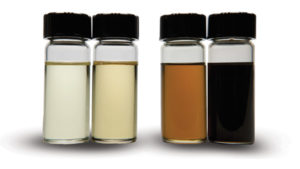 When hydraulic oil turns from that golden honey color of new oil to a dark brown, does that mean it must be changed immediately? Is the system suffering from lost lubricating properties or gross contamination when this occurs, or is this a normal aging characteristic to be dismissed so long as the oil analysis results are within acceptable parameters?
When hydraulic oil turns from that golden honey color of new oil to a dark brown, does that mean it must be changed immediately? Is the system suffering from lost lubricating properties or gross contamination when this occurs, or is this a normal aging characteristic to be dismissed so long as the oil analysis results are within acceptable parameters?
These types of questions are often asked whenever hydraulic fluid maintenance is discussed. Many people compare the oil in their industrial hydraulic systems to that of their automobile, assuming if the oil has turned to a dark brown that it must be changed as soon as possible regardless of how long it has been in service.
It’s easy to forget that the oil in an industrial hydraulic system is kept in a much different environment than the oil in an internal combustion engine. A color change in hydraulic oil is a good reason to be alert but not a good reason to go running for the oil skid to replace it right away. You first need to determine why the oil has changed color.
The two most common causes of oil darkening are thermal stress and oxidation, neither of which will necessarily require that the oil be replaced. The first step is to take a representative sample of the oil and have it analyzed. I have seen hydraulic oil that has darkened considerably but was still perfectly good to remain in service. I have also seen hydraulic oil that has retained its original color but could not meet the parameters necessary to provide adequate system protection. In short, a change in oil color alone tells you nothing about the serviceability of the oil.
However, darkening of the oil can direct you to potential problems that may need to be addressed. Perhaps a system has one or more “hot spots” where the oil is heated up significantly in a localized area, but the temperature is brought down again once it reaches the relatively cool reservoir.
Ultrafine filters for hydraulic oil
Maintenance of hydraulic oil is often neglected. Regular maintenance of oil is a crucial factor for faultless operation. The components in a modern hydraulic unit glide on an oil film of less than 10 μm.
This fine oil film guarantees the smooth operation of the system, however it requires clean oil. In practice, fluids in hydraulic systems are often highly contaminated. This is not always apparent as the visibility threshold for the human eye is approximately 40 μm. The micfil ultrafine filter in the bypass flow has a filter performance of 0.5 μm and provides a continuous cleaning process of hydraulic oils and absorption of water. The filter reduces wear on valves, cylinders and pistons and minimizes the risk of breakdowns.
